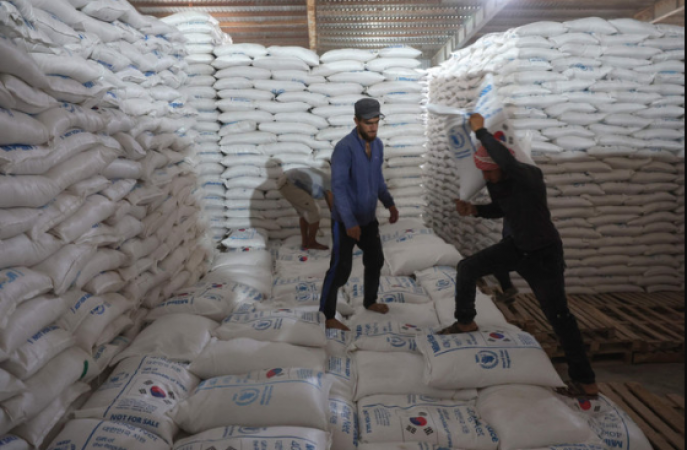
Idlib: Youssef Al-Ramadan claims he feels guilty about making his wife and three children work in order to survive, and now they may not be able to do so because Turkiye may stop providing international aid.
He is concerned that their income might not be enough to cover expenses if the United Nations Security Council is unable to renew a humanitarian border crossing that has been a vital lifeline for him and roughly 4.1 million people in Syria's rebel-held northwest. He is standing outside his tent in a displacement camp in northern Idlib. The vast majority are dependent on aid and live in poverty.
The UN Security Council failed on Tuesday to reopen the Bab Al-Hawa border crossing into northwest Syria, which is controlled by the opposition.
Also Read: UN Demands Greater Action to Combat Religious Intolerance in Wake of Quran Burnings
A compromise resolution put forth by Brazil and Switzerland that would have extended the mandate of the crossing for another nine months was vetoed by Russia, a significant political and military ally of President Bashar Assad. The majority of member states, with the exception of China, voted in favour of it, and the UN Secretary General and humanitarian organisations supported it.
Moscow's competing resolution, which would have extended the mandate for another six months with additional conditions, failed to receive the required nine votes, with only China supporting it.
Also Read: In a UK court, Kevin Spacey claims he has never molested anyone
Secretary-General Antonio Guterres "is not giving up" on attempting to keep the Bab Al-Hawa crossing open, the UN's spokesman Stephane Dujarric emphasised on Wednesday, adding that it continues to be "the centre of gravity of the UN's efforts to deliver aid in the northwest part of Syria."
Al-Ramadan was internally displaced by the ongoing conflict, which has been going on for 13 years, like many other people in Idlib. He claims he is unable to return to his hometown in the province's south because his house and farmland were taken by the Syrian government and Russia.
He told The Associated Press, "They took our land and our homes, and now they want to shut down the border crossing." "What happens if Bab Al-Hawa closes? I can barely survive with it open."
A 7.8 magnitude earthquake that struck Turkiye and northern Syria in both areas controlled by the government and the opposition in February, killing more than 50,000 people, is still having an impact on Syria.
Initial aid deliveries from Turkey, Iraq, and Jordan through four crossing points into Syria's opposition-held regions were approved by the Security Council in 2014. Over time, Russia, supported by China, reduced the mandates from a year to six months, and the authorised crossings to just Bab Al-Hawa from Turkiye.
Russia claims that militant organisations in Idlib are stealing aid and keeping it from getting to needy families. Syrians in the northwest enclave say they are sceptical of the call to phase out the UN cross-border mandate and instead use a route through Damascus.
The five permanent members of the Security Council, France, the United States, the United Kingdom, Russia, and China, were criticised by the Syrian Response Coordination Group for their "strongly irresponsible actions" and "clear disregard for the fate of millions of civilians in Syria."
Also Read: Bali will start charging a $10 electronic tourist tax in 2024 in order to protect its culture
Russian veto was condemned by international humanitarian organisations.
International Rescue Committee President David Miliband said in a statement that it "defies reason and principle" that Security Council members would vote to not maintain all avenues of aid access for vulnerable Syrians at this time.
Idlib's health director, Dr. Munzer Khalil, told The Associated Press that he fears serious public health repercussions if the Security Council does not extend the mandate for the crossing because many hospitals reliant on UN assistance will experience a lack of essential medical equipment and supplies, including vaccines for children.
The recent earthquake in the area highlights "the urgency of addressing the inequitable access to aid in northwest Syria and allocating resources for both long-term and immediate recovery initiatives," Khalil said.